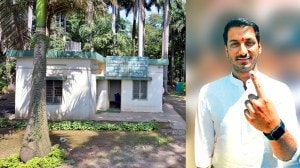Human trial of AIDS vaccine starts
At 20 minutes past noon today, India set out on a hunt for a preventive AIDS vaccine by launching human clinical trial of an investigational...

At 20 minutes past noon today, India set out on a hunt for a preventive AIDS vaccine by launching human clinical trial of an investigational vaccine. Three volunteers, including a woman, were administered an intra-muscular injection at a specially designed vaccine trial clinic at the National AIDS Research Institute (NARI) in Pune.
Specialists hope this vaccine will ultimately contain an epidemic spreading at the rate of 68 new cases every hour.
Union Minister of Health and Family Welfare Anbumani Ramadoss announced the launch of the human clinical trial in New Delhi, hooked via video conferencing with New York and Pune.
Monday’s testing, preparations for which started in 2002, sees India formally joining the multi-country initiative already underway in Germany and Belgium, both of which are conducting trials of the same vaccine.
But it may well take another 8-10 years before the vaccine is ready for use.
The announcement of the Phase I trials, being conducted in partnership with the Indian Council of Medical Research (ICMR), National AIDS Control Organisation (NACO) and International AIDS Vaccine Initiative (IAVI), was made in the presence of some key people — Dr Seth Berkeley, CEO IAVI in New York and Dr Sanjay Mehendale, Principal Investigator of the trial at NARI in Pune, and two Union ministers in New Delhi.
The trials at NARI will involve 34 volunteers. Of these, 30, including 18 women, have been enrolled for Phase I which will take approximately 15 months to be completed. All 30 volunteers are healthy, literate and not infected with HIV, Dr Mehendale said.
The primary aim of the Phase I trials is to evaluate safety of the vaccine, named tgAACO9 (recombinant adeno-associated viral vector, rAAV) and designed by Targeted Genetics Corp, a Seattle-based biotech company, and Columbus Children’s Research Institute (CCRI) in Ohio.
The vaccine candidate is modelled after subtype C of HIV that accounts for most infections worldwide and is prevalent in India and South Africa. The tgAACO9 consists of an artificially made copy of a portion of HIV’s genetic material and it cannot cause HIV infection or AIDS.
According to Berkeley, the estimated cost of the trial is $15 million per volunteer, but other costs need to be factored in if the Phase I vaccine candidate doesn’t work. ‘‘The cost may well work to hundreds of millions of dollars,’’ he said.
Dr N K Ganguly, Director General, ICMR, was hopeful of the trials in Pune as the Germany and Belgium trials, also held in collaboration with IAVI, have shown excellent ‘‘safety’’ results.
Minister of State for Science and Technology Kapil Sibal spoke of India’s commitment to developing an anti-AIDS vaccine, commenting that the disease was no less lethal than a tsunami. A global leadership partnership has been set up with India, Brazil and South Africa as core partners.
‘‘The world community needs to be persuaded to take up this agenda seriously… 14,000 people are getting infected everyday across the world,’’ Sibal said.
‘‘Volunteers are the unsung heroes,’’ Berkeley said and praised the political commitment in India for the cause.
‘‘It is a scientific challenge and India is essential to the global effort in developing a vaccine. Her biotech and pharma industry is strong and political commitment has been stronger in India than anywhere else,’’ he said. Measures for the welfare of the volunteers include medical insurance for the trial period upto five years, a provision to extend the tenure if and when necessary, and reimbursement of travel expenses.



- 01
- 02
- 03
- 04
- 05




























